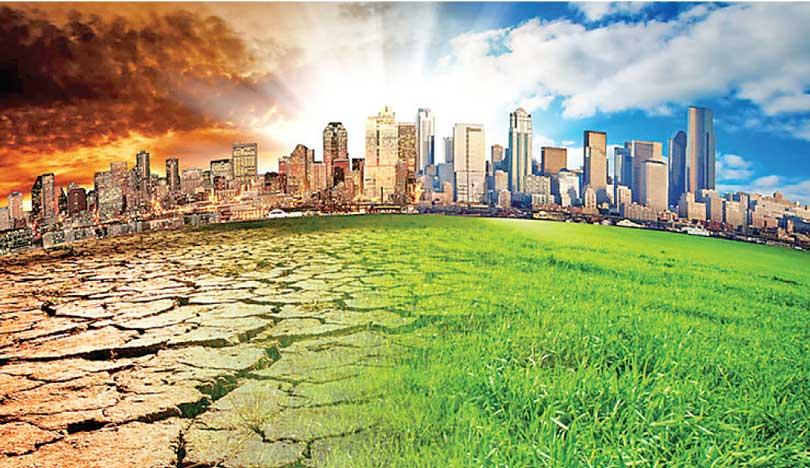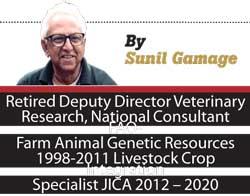Reply To:
Name - Reply Comment

- The production model of the home garden farming system is critical in establishing a year-round food production system, as commercial food production may be affected by climate change and destroyed
- Politicians, planners, businesspeople, and consumers have yet to recognize the importance of this agrarian population, which relies on rain-fed income sources like agriculture, livestock, plantation, and inland fisheries
 The vulnerability of the food-producing agricultural community to climate change will worsen over the next decade. Droughts are expected to have a significant impact on rice crop yields. Climate change is widely expected to have a negative impact on vegetable and fruit production. As a result, this will create a serious food shortage and also severely restrict farmer income generation. Consequently, a large number from the rural community will migrate from agricultural areas of Sri Lanka to already congested urban areas. This will necessitate a long-term solution. Today’s Sri Lankan population under the age of 50 will definitely bear the brunt of this situation. However, the majority of today’s policymakers and policy implementers are over the age of 50, and they may not be concerned enough about this situation.
The vulnerability of the food-producing agricultural community to climate change will worsen over the next decade. Droughts are expected to have a significant impact on rice crop yields. Climate change is widely expected to have a negative impact on vegetable and fruit production. As a result, this will create a serious food shortage and also severely restrict farmer income generation. Consequently, a large number from the rural community will migrate from agricultural areas of Sri Lanka to already congested urban areas. This will necessitate a long-term solution. Today’s Sri Lankan population under the age of 50 will definitely bear the brunt of this situation. However, the majority of today’s policymakers and policy implementers are over the age of 50, and they may not be concerned enough about this situation.
However, it must be noted that despite massive constraints, areas outside of urban Sri Lanka produce roughly 80% of the national food supply. Nevertheless, according to a recent survey, a farming household with a 4.5 family size earns around US$ 6.0–8.5 (or US$ 1.3–1.9 per person) per day. Hence, 82% of farmers work outside of agriculture to supplement their family income. Significant poverty and inequality persist in these food-producing agrarian communities, where four out of every five people live below the international poverty line and one-third of women are unemployed. As a result, the majority of people in this community are forced to seek employment in cities in order to support their families. If they are unable to find work near their home, they either migrate to cities or send a family member to work abroad.
This means that 82% of farmers work part-time which can have a direct influence on high input-high output agriculture, resulting in low productivity. Furthermore, crop productivity is heavily dependent on rainfall. The impending climate change situation will harm commercial agriculture and rural economies. This situation may affect the 2030 Agenda for Sustainable Development Goals. Despite the fact that agriculture’s economic importance is declining, this situation emphasizes the importance of improving household income of our food producers. Hence, it is still an important part of the island’s economy and cultural foundation. Politicians, planners, businesspeople, and consumers have yet to recognize the importance of this agrarian population, which relies on rain-fed income sources like agriculture, livestock, plantation, and inland fisheries.
Aside from climate change, the current Corona pandemic has caused agricultural input price increases, which have become a serious threat to the commercial food production system today. Furthermore, traditional agricultural practices that have been used for thousands of years cannot be used in commercial food cultivation due to a variety of constraints. Replacing inorganic fertilizer with organic fertilizer abruptly is not the solution for fertilizer response hybrid seed. These traditional agricultural practices, on the other hand, can be applied immediately in the now-defunct home garden farming systems, and then later to commercial agriculture.
The transition from hunter-gatherer to agricultural society was significant, but humans continued to coexist with forests by creating this forest-inspired home garden. This man-made forest, also served as a source of food, fuel, fiber, and medicine. Traditional practices such as agroforestry, intercropping, crop rotation, cover cropping, traditional organic composting, and integrated crop-animal farming, which could be implemented in this home garden became a success, as they had the potential to increase food security while mitigating climate change. Furthermore, this traditional home garden farming system is the best solution for ensuring year-round food security in the face of climate change. Resilience of our rural societies to sustain livelihoods in the face of climate change disasters can be enhanced by this home garden. The strength of this artificial forest or home garden is that it has evolved into a farming system that combines physical, social, and economic functions on land adjacent to the family home. This area is easily accessible to all family members for farm produce work, storage, and processing, as well as a location where household waste is disposed of or recycled. To ensure its long-term viability, all of these functions are frequently equally important and intertwined with one another. Unlike commercial agriculture, which relies heavily on imported inputs, this will ensure low-input food production to the household.
As a result of this interdependence, low-input dairy cattle and backyard poultry production became a source of strength for the farming family. Furthermore, not only does it fit the home garden farming system, it also increases the asset value of the farming household. Moreover, in the past, the home garden farming system served as a repository for indigenous crop, medicinal, and livestock genes. These traditional food crops and farm animal genetic resources are bio-assets with the potential to solve future food issues caused by climate change.
These indigenous poultry breeds are still managed by women. Small-scale poultry production systems, also known as “Family Poultry”, rely on family labour and locally available feed resources. Aside from nutrition, another function of “Family Poultry” is to generate income. Chickens are among the most affordable livestock in resource-poor settings, and they can be sold or exchanged for sequentially larger and higher-value species (such as goats or cattle), as well as to increase a household’s asset base or cash income in times of need. The production model of the home garden farming system is critical in establishing a year-round food production system, as commercial food production may be affected by climate change and destroyed. As a result, increased family income and stability will, on the one hand, prevent this community from migrating locally and internationally, while also enabling the achievement of SDGs by 2030. This proposed system has existed since man’s transition from hunting to farming.
Men and women’s socially constructed gender roles have a significant impact on household food production, consumption, nutrition, and income generation. Women prepare all food in Sri Lanka, and traditionally, women are limited to housework. Men perform the majority of commercial crop cultivation activities, with women participating in some areas such as home gardening, livestock and poultry, transplanting, weeding, harvesting, and processing. These strenuous activities performed by women are not considered as employment. As a result, according to government statistics, one-third of rural women in Sri Lanka are unemployed. Based on this information, the government changed its policies to empower women by employing them in garment factories in rural Sri Lanka or finding them jobs in other countries. Because most year-round food-producing home gardens were neglected, this exacerbated the problem. Furthermore, the loss of labour provided by these household women’s employment elsewhere impacted the commercial food production system.
Developing a home garden system is critical to stop rural people from migrating to cities and face food shortages as a result of impending climate change. This process can be accelerated by incorporating backyard poultry and dairy cattle in the hopes of revitalizing the now-defunct home garden.